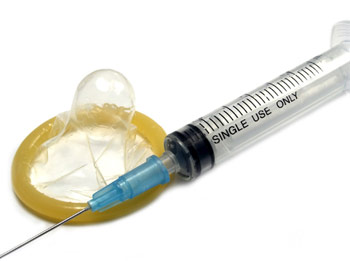You’ve heard about Gonorrhea, Chlamydia, Herpes, Warts, and Syphilis, the most common Sexually Transmitted Infections (STIs). We forget that Hepatitis B and C are sexually transmitted also.
 Gonorrhea and Chlamydia infect the urine tube, the urethra and other sexual organ tubes, the ovaries, and testicles. The test is easy; we check the first urine that comes out of the urine tube. These, the two hepatitis viruses, and HIV are prevented by condoms.
Gonorrhea and Chlamydia infect the urine tube, the urethra and other sexual organ tubes, the ovaries, and testicles. The test is easy; we check the first urine that comes out of the urine tube. These, the two hepatitis viruses, and HIV are prevented by condoms.
Skin infections inside and outside of the condom area are Herpes, Warts, and Syphilis. Of course warts can move up the rectum, vagina, or the urine tube needing surgery.
For warts, to diagnose them, we just look at them. For Herpes, we sometimes need a culture to make sure what we are looking at is herpes. For Syphilis, Hepatitis B and C we check blood tests.
Hepatitis B and C transmission is mainly through needles, such as drug abuse or unsterile tattoo needles (in your friend’s kitchen or at the prison).
I was noticing that many of my HIV patients were coming up with Hepatitis C but hadn’t used needles, so I suspected it was more sexually transmitted than previously thought. Just recently, the CDC has agreed that Hepatitis C is transmitted through sex more so than they thought.
Hepatitis B is easily treated by medicines that also treat HIV, so we combine treatment usually.
A few patients cure themselves of Hepatitis C. Hepatitis C is curable, and is treated now through a difficult but doable protocol. There is an injected drug once a week and a pill to take for roughly 1 year in most cases. New drugs have come out and they must be taken by mouth for the first few months to really knock down the virus. Then you continue the treatment for the rest of the term, usually a year. Side effects can be like the flu, fatigue, anemia, and depression. If your blood viral load test goes way down the first month and third month, then you should continue the full treatment. If not, you stop and wait for a better treatment in the future. The early reports from the new booster pills are quite promising, increasing success.
Hepatitis C, unlike diabetes or HIV is curable and treatment should be begun after your liver is assessed for how much it has proceeded to cirrhosis, i.e. being replaced by scar tissue. This can be done with blood tests, an ultrasound test, and/or a biopsy. If you have very little scarring, perhaps waiting a while till newer drugs and strategies are available is wise. If you are in the middle stages you should start treatment soon since waiting for cirrhosis will mean that it is very uncommon to have a successful treatment and you may or may not be able to get a transplant (now that is a big deal and risky too).
Being of African descent or having HIV lowers your chance of success. If you have one of the less common forms of Hepatitis C, genotypes 2 or 3, then your chance of success is increased.
The best way to receive the latest and most powerful treatments is to enroll in a clinical trial. Clinical trials employ cutting edge techniques and/or strategies to bring you safer, more effective, and shorter treatments, usually free of cost (it can cost up to $100K). The major centers with Hepatitis C studies can be found on clinicaltrials.gov; and they are mainly at the Veterans Administration Hospitals (veterans only), UCLA, and the Southern California Liver Centers in Coronado (San Diego County), Riverside, Palm Springs, and San Clemente.
If you have HIV and are at a very early stage, then we would consider treating your Hepatitis C first. If you are not very early in your disease, then we would control your HIV first. As we mentioned earlier, HIV patients are less curable from Hepatitis C than those without HIV. If you have a CD4 less than 300, your chances are even worse, so concentrate on killing HIV and when the CD4s rise enough, then consider treating the Hepatitis C. The lower your CD4 count the longer it takes for your immune system to recover to 300, some never do! All the while, the Hepatitis C is progressing. So there’s another reason for getting your HIV test routinely if you are having unprotected sex.
There are many new drugs for Hepatitis C coming out. The clinical trials are combining these new medications with the older drugs to increase success. If wonderful success is achieved with these new pills, then maybe there will be trials without one or both of the older, more toxic medications.
This situation is very similar to the early days of HIV therapy. We had patients on toxic, less effective medications. But over the years, with much hard work, the correct strategy, with powerful, but tolerable medications arrived. The problem is that with the Hepatitis C epidemic also is that people will die before the wonderful age arrives, the clock is ticking for them. They should do their best to eradicate their Hepatitis C when their provider advises.
Wear condoms 100% and get HIV tested routinely.
Keep those questions coming. Send them to readelante@aol.com
Daniel Pearce, D.O., FACOI, AAHIVS
Associate Clinical Professor of Internal Medicine, Loma Linda University
HIV Specialist, Riverside County Public Health Department

